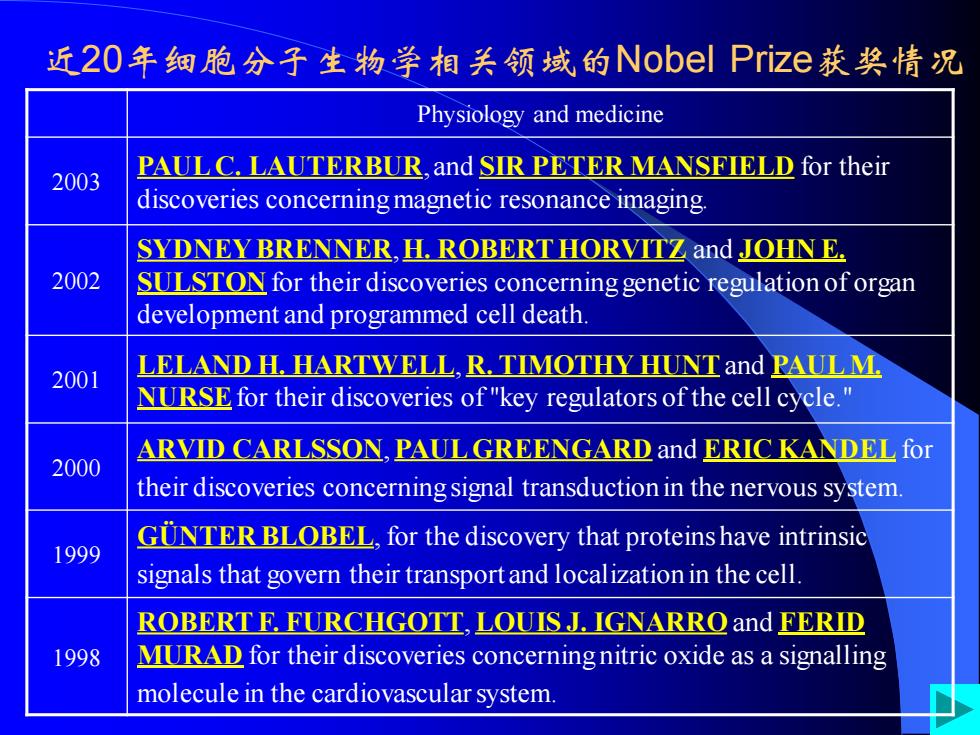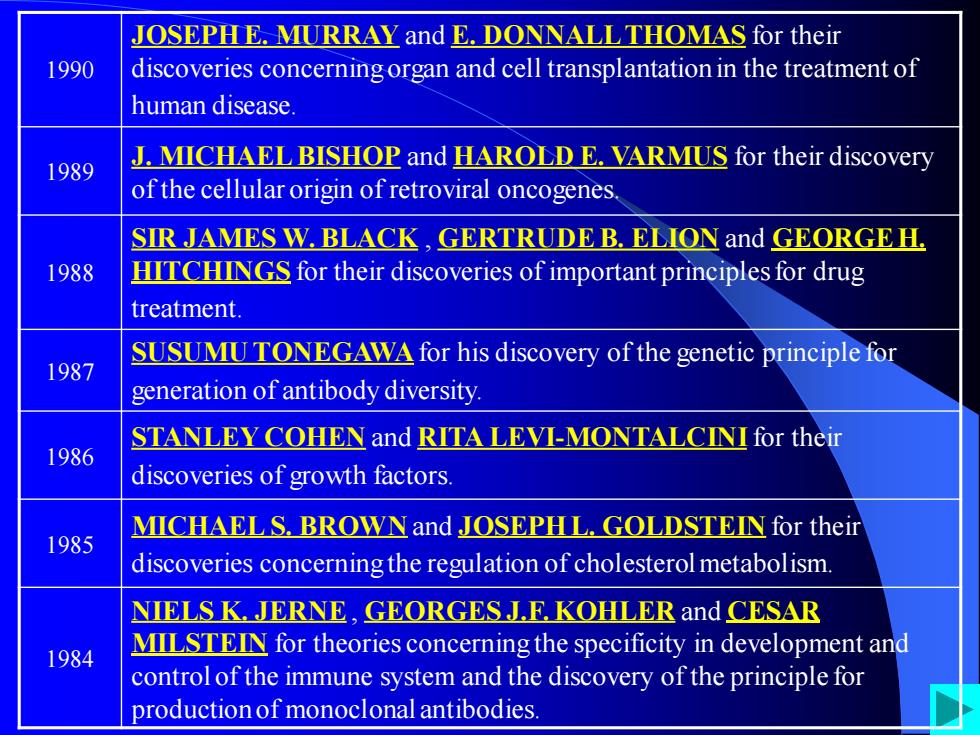
实验细胞学是指采用实验的手段研究细胞学的问题, 即从形态结构的观察深入到生理功能、生物化学及 遗传发育机理的研究。由于实验研究不断同相邻学 科结合、渗透,导致了一些重要分支学科的建立和 发展。 ◆cytogenetics的研究 ◆cytophysiology的研究 1912年, Carrel研制成Carrel培养瓶,采用严格的组 织培养技术,成功地培养了鸡胚胎成纤维细胞持续了 34年之久(1912-1946); ◆cytochemistry的研究
实验细胞学是指采用实验的手段研究细胞学的问题, 即从形态结构的观察深入到生理功能、生物化学及 遗传发育机理的研究。由于实验研究不断同相邻学 科结合、渗透,导致了一些重要分支学科的建立和 发展。 ◆cytogenetics的研究 ◆cytophysiology的研究 1912年, Carrel研制成Carrel培养瓶,采用严格的组 织培养技术,成功地培养了鸡胚胎成纤维细胞持续了 34年之久(1912-1946); ◆cytochemistry的研究

近20年细胞分子生物学相关领域的Nobel Prize获奖情况 Physiology and medicine 2003 PAUL C. LAUTERBUR, and SIR PETER MANSFIELD for their discoveries concerning magnetic resonance imaging. 2002 SYDNEY BRENNER, H. ROBERT HORVITZ and JOHN E. SULSTON for their discoveries concerning genetic regulation of organ development and programmed cell death. 2001 LELAND H. HARTWELL, R. TIMOTHY HUNTand PAUL M. NURSEfor their discoveries of "key regulators of the cell cycle." 2000 ARVID CARLSSON, PAUL GREENGARD and ERIC KANDEL for their discoveries concerning signal transduction in the nervous system. 1999 GÜNTER BLOBEL, for the discovery that proteins have intrinsic signals that govern their transport and localization in the cell. 1998 ROBERT F. FURCHGOTT, LOUIS J. IGNARRO and FERID MURAD for their discoveries concerning nitric oxide as a signalling molecule in the cardiovascular system
近20年细胞分子生物学相关领域的Nobel Prize获奖情况 Physiology and medicine 2003 PAUL C. LAUTERBUR, and SIR PETER MANSFIELD for their discoveries concerning magnetic resonance imaging. 2002 SYDNEY BRENNER, H. ROBERT HORVITZ and JOHN E. SULSTON for their discoveries concerning genetic regulation of organ development and programmed cell death. 2001 LELAND H. HARTWELL, R. TIMOTHY HUNTand PAUL M. NURSEfor their discoveries of "key regulators of the cell cycle." 2000 ARVID CARLSSON, PAUL GREENGARD and ERIC KANDEL for their discoveries concerning signal transduction in the nervous system. 1999 GÜNTER BLOBEL, for the discovery that proteins have intrinsic signals that govern their transport and localization in the cell. 1998 ROBERT F. FURCHGOTT, LOUIS J. IGNARRO and FERID MURAD for their discoveries concerning nitric oxide as a signalling molecule in the cardiovascular system

1997 STANLEY B. PRUSINER for his discovery of Prions - a new biological principle of infection 1996 PETER C. DOHERTY and ROLF M. ZINKERNAGEL for their discoveries concerning the specificity of the cell mediated immune defence. 1995 EDWARD B. LEWIS, CHRISTIANE N躍SLEIN-VOLHARD and ERIC F. WIESCHAUS for their discoveries concerning the genetic control of early embryonic development. 1994 ALFRED G. GILMAN and MARTIN RODBELL for their discovery of G-proteins and the role of these proteins in signal transduction in cells. 1993 RICHARD J. ROBERTS and PHILLIP A. SHARP for their independent discoveries of split genes. 1992 EDMOND H. FISCHER and EDWIN G. KREBS for their discoveries concerning reversible protein phosphorylation as a biological regulatory mechanism. 1991 ERWIN NEHER and BERT SAKMANN for their discoveries concerning the function of single ion channels in cells
1997 STANLEY B. PRUSINER for his discovery of Prions - a new biological principle of infection 1996 PETER C. DOHERTY and ROLF M. ZINKERNAGEL for their discoveries concerning the specificity of the cell mediated immune defence. 1995 EDWARD B. LEWIS, CHRISTIANE N躍SLEIN-VOLHARD and ERIC F. WIESCHAUS for their discoveries concerning the genetic control of early embryonic development. 1994 ALFRED G. GILMAN and MARTIN RODBELL for their discovery of G-proteins and the role of these proteins in signal transduction in cells. 1993 RICHARD J. ROBERTS and PHILLIP A. SHARP for their independent discoveries of split genes. 1992 EDMOND H. FISCHER and EDWIN G. KREBS for their discoveries concerning reversible protein phosphorylation as a biological regulatory mechanism. 1991 ERWIN NEHER and BERT SAKMANN for their discoveries concerning the function of single ion channels in cells

1990 JOSEPH E. MURRAY and E. DONNALL THOMAS for their discoveries concerning organ and cell transplantation in the treatment of human disease. 1989 J. MICHAEL BISHOP and HAROLD E. VARMUS for their discovery of the cellular origin of retroviral oncogenes. 1988 SIR JAMES W. BLACK , GERTRUDE B. ELION and GEORGE H. HITCHINGS for their discoveries of important principles for drug treatment. 1987 SUSUMU TONEGAWAfor his discovery of the genetic principle for generation of antibody diversity. 1986 STANLEY COHEN and RITA LEVI-MONTALCINIfor their discoveries of growth factors. 1985 MICHAEL S. BROWN and JOSEPH L. GOLDSTEIN for their discoveries concerning the regulation of cholesterol metabolism. 1984 NIELS K. JERNE, GEORGES J.F. KOHLER and CESAR MILSTEIN for theories concerning the specificity in development and control of the immune system and the discovery of the principle for production of monoclonal antibodies
1990 JOSEPH E. MURRAY and E. DONNALL THOMAS for their discoveries concerning organ and cell transplantation in the treatment of human disease. 1989 J. MICHAEL BISHOP and HAROLD E. VARMUS for their discovery of the cellular origin of retroviral oncogenes. 1988 SIR JAMES W. BLACK , GERTRUDE B. ELION and GEORGE H. HITCHINGS for their discoveries of important principles for drug treatment. 1987 SUSUMU TONEGAWAfor his discovery of the genetic principle for generation of antibody diversity. 1986 STANLEY COHEN and RITA LEVI-MONTALCINIfor their discoveries of growth factors. 1985 MICHAEL S. BROWN and JOSEPH L. GOLDSTEIN for their discoveries concerning the regulation of cholesterol metabolism. 1984 NIELS K. JERNE, GEORGES J.F. KOHLER and CESAR MILSTEIN for theories concerning the specificity in development and control of the immune system and the discovery of the principle for production of monoclonal antibodies